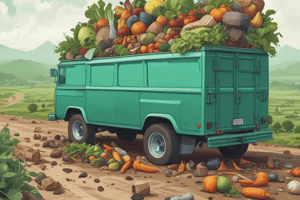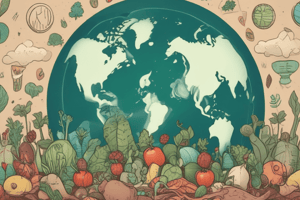Podcast
Questions and Answers
What is the main advantage of plug flow digesters?
What is the main advantage of plug flow digesters?
lower capital cost
What is a disadvantage associated with plug flow digesters?
What is a disadvantage associated with plug flow digesters?
high power cost associated with supplying the required oxygen
What are some benefits of composting? (Select all that apply)
What are some benefits of composting? (Select all that apply)
- Improved tilth and water holding capacity (correct)
- Increase in soil organic matter concentration (correct)
- Suppression of weeds (correct)
- Long-term supply of nutrients (correct)
Bioremediation employs unnatural microorganisms to degrade hazardous substances.
Bioremediation employs unnatural microorganisms to degrade hazardous substances.
Bioremediation occurs under either __________ conditions.
Bioremediation occurs under either __________ conditions.
What is the most abundant waste in the food industry?
What is the most abundant waste in the food industry?
What are the main components of food waste?
What are the main components of food waste?
Anaerobic digestion is a process that occurs in the presence of oxygen.
Anaerobic digestion is a process that occurs in the presence of oxygen.
______ digestion can generate electricity and heat through the combustion of biogas.
______ digestion can generate electricity and heat through the combustion of biogas.
Match the following food waste with its type of waste management process:
Match the following food waste with its type of waste management process:
Flashcards are hidden until you start studying
Study Notes
Food Industrial Waste Engineering
- Food Processing Waste: Fruit and vegetable waste, Meat and poultry products waste, Dairy products waste, Fish and seafood product waste
- Biological Treatment: Anaerobic digestion, Aerobic digestion, Biodiesel production, Composting, Coagulation/Electrocoagulation/Precipitation/Flocculation, Bioremediation
Fruit and Vegetable Waste
- Highly biodegradable
- Waste generation: Fiber, pigments, seeds, nutrients
- Causes pollution during processing
Meat and Poultry Products Waste
- Contributes to major waste generation
- Waste present in almost every process: Water waste, Solid waste, Fats, oils, and greases (FOG)
- Alternative use: Protein recovery and feed, Energy recovery, Heavy metal adsorption
Dairy Products Waste
- Main waste: Dairy wastewater containing Fats, oils, Protein, Salt, Lactose, and chemicals
- High BOD and COD
- Wastewater treatment: Fermentation, Aeration, and Plastic packaging
Fish and Seafood Products Waste
- Different types of waste generated during processing: Skin, Bone, Fat, Washing water, Head, shell
- Acid/alkali waste from protein extraction, encapsulation
Food Packaging Waste
- Types of packaging materials: Glass, Aluminum, Paper/carton, Polymer
- Waste management: Recycling, Landfill, Composting, Incineration, Re-use
Biological Waste Treatment
- Anaerobic Digestion: Breaks down biodegradable material in the absence of oxygen, Produces biogas, Can be used for energy production
- Aerobic Digestion: Takes place in the presence of oxygen, Consumes organic matter and converts it into carbon dioxide, Frequently used to remove pollution from wastewaters
- Biodiesel Production: Uses fruit and vegetable waste as a source, Produces a bio-degradable and non-toxic alternative fuel
- Composting: Converts organic matter into a stable substance, Suppresses weeds and provides a long-term supply of nutrients, Can be used as a fertilizer or soil conditioner
- Coagulation/Electrocoagulation/Precipitation/Flocculation: Removes suspended matter or color, Increases particle size through aggregation, Uses chemical precipitants, coagulants, and flocculators
- Bioremediation: Employs naturally occurring microorganisms to break down hazardous substances, Can be used under aerobic or anaerobic conditions
Waste Management
- Landfilling: Consists of five stages: Hydrolysis/aerobic degradation, Hydrolysis and fermentation, Acetogenesis, Methanogenesis, Oxidation
Studying That Suits You
Use AI to generate personalized quizzes and flashcards to suit your learning preferences.




